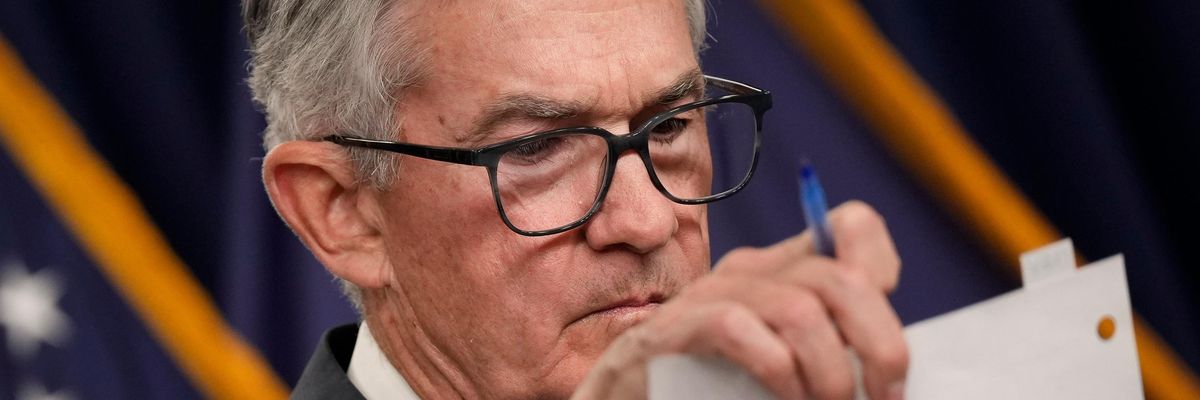Price data released Thursday by the U.S. Labor Department shows that inflation eased slightly in October, bolstering calls for the Federal Reserve to stop hiking interest rates before it pushes the economy into recession and throws millions out of work.
According to the Bureau of Labor Statistics, the Consumer Price Index (CPI) rose 0.4% in October and 7.7% year over year--down from 8.2% year over year in September and the smallest increase since January. Core inflation, which refers to the CPI stripped of highly volatile food and energy prices, rose 0.3% in October, a slower rate than the 0.6% jump the previous month.
"The Fed should pump the brakes, especially as leading economists warn continued aggressive interest rate hikes could crush millions of jobs."
Dean Baker, senior economist at the Center for Economic and Policy Research, called the new inflation report "very positive" and argued it "helps bolster the case for a pause on rate hikes," noting that prices are slowing in a range of categories--from medical services to key food items such as beef and milk.
"Not only did the Consumer Price Index come in slightly lower than expected, we are seeing no evidence that inflation is becoming embedded in services, as many had predicted," Baker wrote in a blog post. "We have turned the corner on most supply chain items, with rapid price declines in many areas."
Justin Wolfers, a professor of public policy and economics at the University of Michigan, echoed Baker's assessment, calling the numbers "very encouraging."
"There's a good chance that inflation has peaked, and is now turning down," Wolfers added.
The CPI data was released just over a week after the Fed enacted its fourth consecutive interest rate increase of 75 basis points, bringing the total number of hikes to six this year alone.
The speed and size of rate increases have sparked growing alarm among economists, lawmakers, and organized labor that the Fed is preparing to induce a punishing recession and large-scale layoffs to bring prices down.
"The Fed stubbornly insists raising interest rates is the only way to drive down inflation, but we should be focused on corporate greed," Liz Zelnick, spokesperson for the watchdog group Accountable.US, said in a statement Thursday. "Highly profitable corporations have only jacked up prices more on working families while rewarding wealthy investors with billions in new handouts."
"The Fed should pump the brakes, especially as leading economists warn continued aggressive interest rate hikes could crush millions of jobs," Zelnick continued. "Throughout the pandemic, the Fed has catered to demands from big banks, hedge funds, and other Wall Street special interests at the expense of average working families. If excessive interest rate hikes speed up the arrival of an otherwise avoidable recession, will the Fed take responsibility--or try to pass the buck as they keep making matters worse?"
During a press conference last week following the central bank's latest rate hike announcement, Fed Chair Jerome Powell struck a hawkish tone, declaring it is "very premature to be thinking about pausing" interest rate increases despite mounting concerns over the cumulative effects of past rate hikes and damaging spillover impacts overseas, particularly in poor countries.
Defying vocal protests from economists across the ideological spectrum, Powell indicated that the Fed is likely to continue raising rates in 2023 following an expected hike at its upcoming December meeting.
In a letter sent two days after Powell's public remarks, Rep. Maxine Waters (D-Calif.)--chair of the House Financial Services Committee--wrote that she is "deeply troubled" by the Fed's "rapid series of super-sized interest rate hikes, which may inflict unnecessary pain on millions of individuals and families while sending the economy into a devastating recession."
"Enough is enough," Waters continued. "Instead of promoting price stability, experts are increasingly alarmed that the Fed may be over-correcting for inflation without properly considering the limits of its tools or the impacts of its decisions. The Fed itself has acknowledged that it can take time for an interest rate increase to fully take hold on the economy, so I implore the Fed to heed these dynamics and warnings before moving forward with additional rate hikes."
